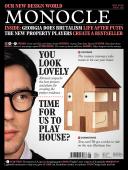
Issue 123
Our new design world. We unpack the best projects and plans for creating the perfect residence.
In This Issue
Oops! No content was found.
Looks like we no longer have content for the page you're on. Perhaps try a search?
Return Home
Daily inbox intelligence from Monocle

Our new design world. We unpack the best projects and plans for creating the perfect residence.
Looks like we no longer have content for the page you're on. Perhaps try a search?
Return Home